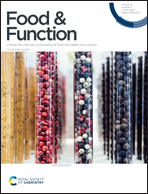Responses of the gut microbiota and metabolite profiles to sulfated polysaccharides from sea cucumber in humanized microbiota mice†
Abstract
Sea cucumber Stichopus japonicus has been consumed as functional food traditionally in Asia, and its sulfated polysaccharide (SCSPsj) demonstrates health-promoting effects in rodents which are related to the regulation of the gut microbiota. However, little is known about the response of the human gut microbiota to SCSPsj. Therefore, the present study aimed to study the response of the donor microbiota to SCSPsj in vivo through a humanized microbiota mice model, which was constructed by antibiotic treatment combined with fecal microbiota transplant. The results revealed that the SCSPsj supplement could positively interact with the specific donor microbiota. It could significantly regulate the gut microbiota community, especially the abundance of Lactobacillus. In addition, SCSPsj could modulate the metabolites in serum and cecal contents of mice, including short-chain fatty acids (SCFAs) and lactic acid, and the changes of some bioactive metabolites were associated with the gut microbiota enriched by SCSPsj. Furthermore, in vitro experiments demonstrated that the Lactobacillus strains isolated could not be proliferated directly by SCSPsj, but SCSPsj significantly promoted biofilm formation and mucus binding of Lactobacillus spp., which contributed to the enrichment of Lactobacillus in vivo. The present study could provide insight into the application of SCSPsj as microbiota-directed food.



 Please wait while we load your content...
Please wait while we load your content...